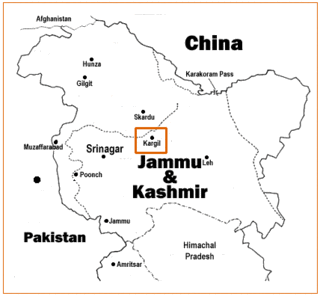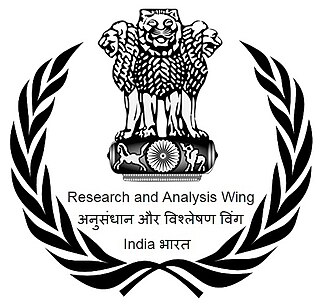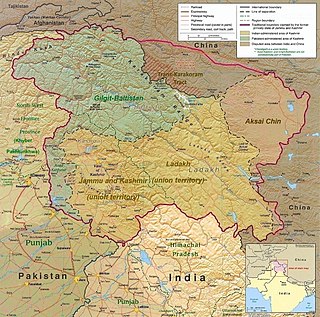Related Research Articles

Since the Partition of British India in 1947 and subsequent creation of the dominions of India and Pakistan, the two countries have been involved in a number of wars, conflicts, and military standoffs. A long-running dispute over Kashmir and cross-border terrorism have been the predominant cause of conflict between the two states, with the exception of the Indo-Pakistani War of 1971, which occurred as a direct result of hostilities stemming from the Bangladesh Liberation War in erstwhile East Pakistan.

The Kargil War, also known as the Kargil conflict, was fought between India and Pakistan from May to July 1999 in the Kargil district of Jammu and Kashmir and elsewhere along the Line of Control (LoC). In India, the conflict is also referred to as Operation Vijay, which was the codename of the Indian military operation in the region. The role of the Indian Air Force in acting jointly with the Indian Army was aimed at flushing out both the Pakistan Army and paramilitary troops from vacated Indian positions along the LoC, in what was designated as Operation Safed Sagar.

The Research and Analysis Wing is the foreign intelligence agency of India. The agency's primary function is gathering foreign intelligence, counter-terrorism, counter-proliferation, advising Indian policymakers, and advancing India's foreign strategic interests. It is also involved in the security of India's nuclear programme.

The Siachen Glacier is a glacier located in the eastern Karakoram range in the Himalayas at about 35.421226°N 77.109540°E, just northeast of the point NJ9842 where the Line of Control between India and Pakistan ends. At 76 km (47 mi) long, it is the longest glacier in the Karakoram and second-longest in the world's non-polar areas. It falls from an altitude of 5,753 m (18,875 ft) above sea level at its head at Indira Col on the India–China border down to 3,620 m (11,875 ft) at its terminus. The entire Siachen Glacier, with all major passes, has been under the administration of India since 1984. Pakistan maintains a territorial claim over the Siachen Glacier and controls the region west of Saltoro Ridge, lying west of the glacier, with Pakistani posts located 3,000 ft below more than 100 Indian posts on the ridge.
Communalism is a term used to denote attempts to construct religious or ethnic identity, incite strife between people identified as different communities, and to stimulate communal violence between those groups. It derives from history, differences in beliefs, and tensions between the communities. Communalism is a significant social issue in India, Bangladesh, Pakistan and Sri Lanka. Communal conflicts between religious communities in India, especially Hindus and Muslims have occurred since the period of British colonial rule, occasionally leading to serious inter-communal violence.

The Trans-Karakoram Tract, also known as the Shaksgam Tract, is an area of approximately 5,300 km2 (2,050 sq mi) north of the Karakoram watershed, including the Shaksgam valley. The tract is administered by China as part of its Taxkorgan and Yecheng counties in the Xinjiang Uyghur Autonomous Region. Although the Shaksgam tract was never under the control of Pakistan since 1947, in the 1963 Sino-Pakistan Agreement, Pakistan recognized Chinese sovereignty over the Shaksgam tract, while China recognized Pakistani sovereignty over the Gilgit Agency, and a border based on actual ground positions was recognized as the international border by China and Pakistan. It is claimed by India as part of the Union territory of Ladakh.

India–Pakistan relations are the bilateral ties between the Republic of India and the Islamic Republic of Pakistan. The two countries have a complex and largely hostile relationship that is rooted in a multitude of historical and political events, most notably the partition of British India in August 1947; the India–Pakistan border is one of the most militarised international boundaries in the world. Northern India and most of modern-day Pakistan overlap with each other in terms of their common Indo-Aryan demographic, natively speaking a variety of Indo-Aryan languages.

Operation Meghdoot was the codename for the Indian Armed Forces' operation to seize control of the Siachen Glacier in Kashmir, precipitating the Siachen conflict. Executed in the morning of 13 April 1984 in the highest battlefield in the world, Meghdoot was the first military offensive of its kind. The operation preempted Pakistan's impending Operation Ababeel and was a success, resulting in Indian forces gaining control of the Siachen Glacier in its entirety.

The Siachen conflict, sometimes referred to as the Siachen Glacier conflict or the Siachen War, was a military conflict between India and Pakistan over the disputed 1,000-square-mile (2,600 km2) Siachen Glacier region in Kashmir. The conflict was started in 1984 by India's successful capture of the Siachen Glacier as part of Operation Meghdoot, and continued with Operation Rajiv in 1987. India took control of the 70-kilometre-long (43 mi) Siachen Glacier and its tributary glaciers, as well as all the main passes and heights of the Saltoro Ridge immediately west of the glacier, including Sia La, Bilafond La, and Gyong La. Pakistan controls the glacial valleys immediately west of the Saltoro Ridge. A cease-fire went into effect in 2003, but both sides maintain a heavy military presence in the area. The conflict has resulted in thousands of deaths, mostly due to natural hazards. External commentators of have characterized it as pointless, given the perceived uselessness of the territory, and indicative of bitter stubbornness on both sides.

Bilafond La (meaning "Pass of the Butterflies" in Balti language, also known as the Saltoro Pass, is a mountain pass situated on Saltoro Ridge, sitting immediately west of the vast Siachen Glacier, some 40 km directly north of map point NJ 980420 which defined the end of the 1972 Line of Control between Pakistan and India as part of the Simla Agreement. Bilafond La is on the ancient Silk Route linking the Indian Subcontinent and China.
Pakistan and state-sponsored terrorism refers to the involvement of Pakistan in terrorism through the backing of various designated terrorist organizations. Pakistan has been frequently accused by various countries, including its neighbours Afghanistan, India, and Iran, as well as by the United States, the United Kingdom, Germany, and France, of involvement in a variety of terrorist activities in both its local region of South Asia and beyond. Pakistan's northwestern tribal regions along the Afghanistan–Pakistan border have been described as an effective safe haven for terrorists by Western media and the United States Secretary of Defense, while India has accused Pakistan of perpetuating the insurgency in Jammu and Kashmir by providing financial support and armaments to militant groups, as well as by sending state-trained terrorists across the Line of Control and de jure India–Pakistan border to launch attacks in Indian-administered Kashmir and India proper, respectively. According to an analysis published by the Saban Center for Middle East Policy at the Brookings Institution in 2008, Pakistan was reportedly, "with the possible exception of Iran, perhaps the world's most active sponsor of terrorist groups... aiding these groups that pose a direct threat to the United States. Pakistan's active participation has caused thousands of deaths in the region; all these years Pakistan has been supportive to several terrorist groups despite several stern warnings from the international community." Daniel Byman, a professor and senior analyst of terrorism and security at the Center For Middle East Policy, also wrote that, "Pakistan is probably 2008's most active sponsor of terrorism". In 2018, the former Prime Minister of Pakistan, Nawaz Sharif, suggested that the Pakistani government played a role in the 2008 Mumbai attacks that were carried out by Lashkar-e-Taiba, a Pakistan-based Islamist terrorist group. In July 2019, Pakistani Prime Minister Imran Khan, on an official visit to the United States, acknowledged the presence of some 30,000–40,000 armed terrorists operating on Pakistani soil. He further stated that previous administrations were hiding this truth, particularly from the United States, for the last 15 years during the War on Terror.

Gyong La is a mountain pass situated on Saltoro Ridge southwest of the vast Siachen Glacier, some 20 km (12 mi) directly north of map point NJ9842 which defined the end of the 1972 Line of Control between India and Pakistan. With Pakistan controlling areas just to the west along Chumik Glacier, the immediate Gyong La area has been under India's control since 1989. Dozens of Indian military tents and other equipment are visible in 2013 and 2016 Google Earth imagery 100 meters east, 670 meters northeast, and 2.7 km east-northeast of Gyong La, linked by clear trails. Nearer the former Pakistani "Naveed Top" position and 3.85 km west-northwest of Gyong La is a post and helipad is visible in 2001 and 2016 Google Earth imagery at 5,800 m (19,000 ft) elevation, higher than both the Indian positions and Gyong La.

The Actual Ground Position Line (AGPL) divides current positions of Indian and Pakistani military posts and troops across the entire 110 kilometres (68 mi) long front line in the disputed region of Siachen Glacier. AGPL generally runs along the Saltoro Mountains range, beginning from the northernmost point of the (LOC) at Point NJ 9842 and ending in the north on the Indira Ridge at the India-China-Pakistan LAC tripoint near Sia Kangri about 4 km (2.5 mi) northwest of Indira Col West, with peaks in excess of 7,000 m (23,000 ft) and temperatures ranging to around −55 °C (−67 °F). India gained control of 1,000 square miles (2,600 km2) of disputed territory in 1984 because of its military operations in Siachen. A cease-fire was announced in 2003.
Human rights abuses in Kashmir have been perpetrated by various belligerents in the territories controlled by both India and Pakistan since the two countries' conflict over the region began with their first war in 1947–1948, shortly after the partition of British India. The organized breaches of fundamental human rights in Kashmir are tied to the contested territorial status of the region, over which India and Pakistan have fought multiple wars. More specifically, the issue pertains to abuses committed in Indian-administered Kashmir and in Pakistani-administered Kashmir.
Operation Rajiv was the codename for an Indian Army operation that aimed to capture a high point along the Actual Ground Position Line (AGPL) on the Siachen Glacier in June 1987. Prior to this operation, the area had been under the control of Pakistani forces, who had established a post on the peak, designated Quaid Post. Following India's successful capture of the peak, the post was renamed to Bana Top after Naib Subedar Bana Singh, who led the operation. Since Operation Rajiv in 1987, India continues to hold this post, which lies just to the south of the strategic Bilafond La mountain pass, also controlled by India. Alongside the higher-altitude installations, India has also established posts on the slopes at lower heights in this sector.

Al-Qaeda in the Indian Subcontinent usually abbreviated as AQIS, is an Islamist militant organization which aims to fight the governments of Pakistan, Afghanistan, India, Myanmar and Bangladesh in order to establish an Islamic state.
Suhasini Chattopadhyay was an Indian communist leader and a freedom fighter. She was the first woman member of the Communist Party of India.

Indian Airlines Flight 423 was an Indian Airlines Boeing 737 domestic passenger flight from the Delhi-Palam Airport to the Amritsar-Raja Sansi Airport on 29 September 1981. It was hijacked by five Sikh militants of the Dal Khalsa, masterminded by Sikh militants and taken to Lahore Airport in Pakistan. The plane had 111 passengers and 6 crew members on board. The Dal Khalsa had been demanding a separate Sikh homeland of Khalistan.
Peacebuilding in Jammu and Kashmir includes confidence-building measures at a nation-state level between the governments of India and Pakistan, track two diplomacy, as well as initiatives by non-governmental organisations (NGOs), institutes and individuals. The purpose of peacebuilding in Jammu and Kashmir include conflict prevention and reduction of hostilities in the Kashmir Valley. Many countries such as Russia, United States and China have also played a de-escalatory role with regard to tensions in the region.

The foreign policy of the Indira Gandhi government was the foreign policy of India between 1967 and 1977 during the Indira Gandhi premiership. It included a focus on security, by fighting militants abroad and strengthening border defenses. On 30 October 1981 at the meeting organised to mark silver jubilee celebration of the School of International Studies, Gandhi said, "A country’s policy is shaped by many forces- its position on the map, and the countries which are its neighbours, the policies they adopt, and the actions they take, as well as its historical experiences in the aggregate and in terms of its particular success or traumas."
References
- 1 2 "Myra MacDonald". The Times of India . 17 October 2017. Retrieved 6 March 2021.
- ↑ "Myra MacDonald MA, author and former Reuters Bureau Chief, India" (PDF). www.orchardhill.org.uk.
- 1 2 3 4 5 MacDonald, Myra (8 November 2013). "Going home". The Baron. Retrieved 6 March 2021.
- 1 2 "Myra MacDonald". myramacdonald.wordpress.com. November 2007.
- ↑ "Trainees". The Baron. 1 January 2013. Retrieved 6 March 2021.
- 1 2 3 Vij, Shivam (3 December 2012). "'Siachen: India must offer Pak a dignified solution'". Rediff.com . Retrieved 6 March 2020.
- ↑ "Myra MacDonald". WAR ON THE ROCKS. Retrieved 7 March 2020.
- ↑ "The 'Great South Asian War' and its salutary lessons (Book Review)". Business Standard . IANS. 13 April 2017. Retrieved 6 March 2021.
- 1 2 3 4 5 Haidar, Suhasini (25 March 2017). "No winners in this battle". The Hindu . Retrieved 7 March 2021.
- 1 2 3 4 Nathan, Andrew J. (8 December 2016). "Defeat Is an Orphan: How Pakistan Lost the Great South Asian War". Foreign Affairs (published February 2017). Retrieved 7 March 2021.